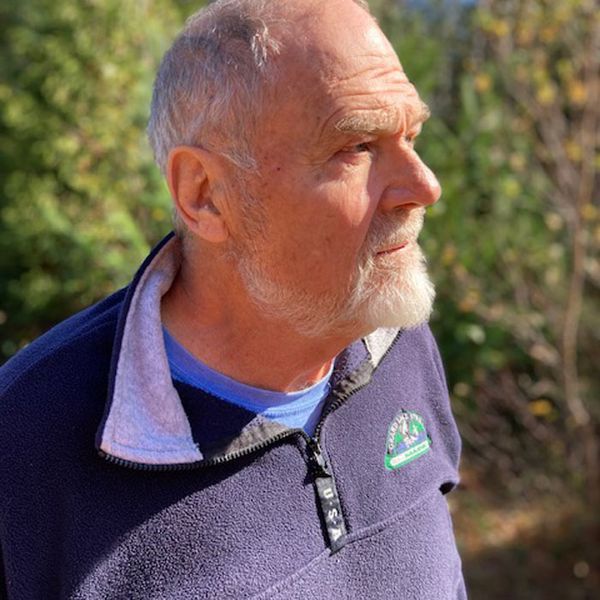Lia Purpura, Decaying Wood (detail), featured in AGNI 102
Small Grenades: Writing and Politics
Who knows what the presidency of a self-regarding, mendacious, and abysmally ill-informed martinet bodes?
For the moment, however, most of us are lucky enough not to live in a system such as the old USSR’s, say, in which—as Joseph Brodsky once said in a journal I edited—merely to describe a flower accurately felt like a political act.
In much of the west, and particularly in the U.S, we face a subtler difficulty than that posed by authoritarian censorship: namely that the authorities (and the “public at large”) are unlikely to be swayed one way or another by anything like fiction or poetry, simply because those arts go largely unnoticed. To that extent, our better writing strategies likely involve newspapers or, more accurately in our day, social media, as opposed to the so-called creative arts.
But even online activism, to name it that, proves problematic, for at least two reasons. The first is that social media can put Einstein in the same house as the village imbecile: thus, if two disparate accounts of the same thing are broadcast, there is no determining which will strike a broad readership as more compelling. This was, off course, painfully exemplified by the idiotic controversy over President Obama’s birthplace. Those who chose to label him a Kenyan were simply not to be dissuaded by indisputable proof of his birth in Hawaii. The social media’s second great liability is that, just as oppressed parties may use them, so may their oppressors, a sad fact illustrated by the ill-starred Arab Spring and by frequent manipulations of information in China, for instance.
In the end, though here I am surely influenced by when I cut my teeth, it may be that more direct political activism—street demonstrations, working harder for genuinely progressive candidates, and so on—are the likeliest avenues to such success as the kind of people reading this may find.
But let us imagine a literature that was an effective tool of change. My surmise is that, like socialist realism, it would, qua writing, be bad or tepid in any case, simply because art founded primarily on an aprioristic agenda is usually doomed to inferiority in my view. As Gregory Wolfe, editor of Image, has written: “The problem with socially conscious art is that, by attempting to address social ills directly, it begins with the notion that it already has the answers and merely needs to dramatize them. The results are predictably didactic and inert.”
All this may sound as though I urge political or social nonchalance upon the artist, urge him or her to be a little Nero, playing the violin as Rome burns. Not at all. In fact, exactly the contrary. Any poet who stayed innocent of the great migrant crisis of the world, for example, would be no poet at all. An artist must be as open as possible to all manner of observation, and must be jealous of those observatory powers, because the threats to them are myriad. To allow that openness to be usurped by anything—even the noblest political or moral conviction—is by my lights suicidal.
Here is a remark, which resonates with me, by my dear friend, poet Fleda Brown: “I’ve long since quit worrying about whether writing itself is a worthy use of my life. Whether it is or isn’t doesn’t change my inclination to do it. Anyway, I’m positive that it matters, words themselves being small bulbs buried under the soil, small grenades.”
I hope that Fleda is right, but in any case, I know that a willful effort to make my poems “political” or “relevant” in the way my own formative 60s demanded will serve no one: not me, not my reader, and not the causes I passionately subscribe to, including resistance to climate change, women’s right to their own bodies, a sane and compassionate attitude toward those disrupted by violence, which would go hand in glove with the development of a non-hysterical stance toward terrorism.
The only thing I really know to do is to beat at my keyboard. If what results is an explosion, I must accept that. If I am moved by a bloom or a bird or the birth of a grandchild, these are what I need to bring forth. The point is, we writers need to sustain belief in our own voices, and in their autonomy– not to the point of perversity or narcissism, but right up to those points. If we allow our voices to be controlled by dogma, even virtuous dogma (if there be such a thing), we might as well be writing advertisements or propaganda. We need to believe that our sincerest testimonies matter, even if we cannot define how that may be in any definitive way. We need to agree with William Carlos William’s assertion that
It is difficult
to get the news from poems
yet men die miserably every day
for lack
of what is found there.
And again I agree with smart Fleda Brown: “Okay, to be really blunt: What do I—as a writer—do about Donald Trump? Theodore Roethke said, ‘My heart keeps open house.’ Omit nothing. Bombs, bullets, butterflies, beetles, Trump.”

Sydney Lea
Sydney Lea is the author of twenty-four books: a novel, five volumes of personal essays, three of critical essays, and fifteen poetry collections, including the forthcoming What Shines (Four Way Books, 2024). A finalist for the Pulitzer Prize and winner of the Poets’ Prize, he is founding editor of New England Review. He served as Vermont’s poet laureate from 2011 to 2015, and in 2021, he received the state’s most prestigious arts distinction: the Governor’s Award for Excellence. (updated 4/2023)
